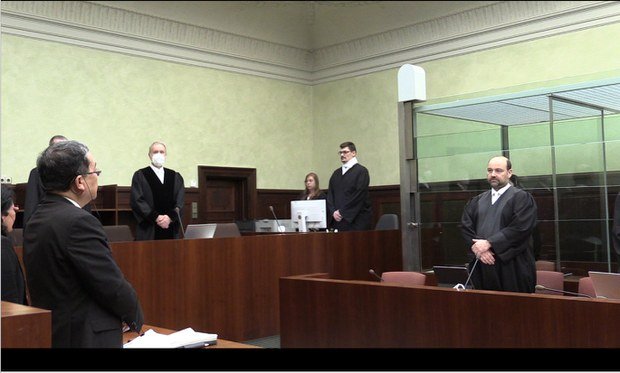
Germany has started the trial of the second suspect in the kidnapping case of Vietnamese oil executive and former provincial official Trinh Xuan Thanh. Proceedings got underway last Wednesday in Berlin.
Le Anh Tu, 32, was living in the Czech capital Prague before the kidnapping in 2017. He is accused of "spying and assisting in the deprivation of liberty," in connection with the abduction of Thanh in a Berlin park in July, 2017.
Tu’s trial comes five years after the case happened because he returned to Vietnam straight after the kidnapping. When he arrived in Prague again, in June this year, Tu was arrested and extradited to Germany.
Le Trung Khoa, a journalist covering the trial, said the proceedings are likely to last until the end of the month.
The indictment says that two weeks before Thanh’s abduction Tu, along with a number of other suspects, invited Thanh"s cousin, who lives in Poland, to come to Prague in order to find out Thanh"s whereabouts and living habits. In the days that followed Tu is accused of tailing Thanh, the journalist said.
Tu is also accused of being in the van that was used to kidnap Thanh and his girlfriend (believed to be Do Minh Phuong) on July 23, 2017, taking them to the Vietnamese Embassy in Berlin, Khoa said.
“The indictment makes it very clear that this man had previously gone to Germany to spy on people like Ms. Phuong or Trinh Xuan Thanh. Finally, on July 23, at around 10 am, he drove the van carrying the Vietnamese secret service agents who kidnapped Trinh Xuan Thanh in Berlin," said Khoa.
He added that Tu also played a role in transporting Thanh out of the Schengen Area of 26 European nations that have abolished border controls. According to the prosecution, Tu and eight other people then drove Thanh from Brno in the Czech Republic to Bratislava. From the Slovakian capital Thanh was allegedly drugged and put on a Slovak government plane and flown back to Vietnam a few days later.
Khoa said Tu also had a history of possessing illegal weapons.
“Le Anh Tu was searched in 2016 by German police in the Munich area who caught him carrying an undocumented weapon. He was fined for the crime of using and possessing an illegal weapon without papers.”
Marina Mai, a German journalist who closely follows the case, told RFA she believed the evidence presented by the Federal Prosecutor"s Office was overwhelming and convincing. For that reason, the court told Tu that if he pleaded guilty his sentence would be reduced and there would be no further trials. Tu is expected to be sentenced to between four and a half and five years in prison.
Tu and his lawyer will decide whether to plead guilty or not at the next trial. During the current trial, Tu insisted that he was not involved in the kidnapping of Thanh and his girlfriend, Mai said.
“In the event that the confession deviates from the indictment, the Federal Prosecutor"s Office will not accept this agreement. So it may take weeks or months to review the evidence,” she said
On July 17, 2018, another defendant, Nguyen Hai Long, pleaded guilty in court to assisting the Vietnamese secret service in kidnapping Thanh. He previously insisted he did not know anything about the kidnapping.
Long was sentenced eight days later to three years and ten months in prison by a German court. He was charged with two counts of assisting in the kidnapping of Thanh and spying in Germany.
The German police said Long had a shop in Prague specializing in money exchange and transfer services. They said Long hired a car for the Vietnamese secret service to transport Thanh from Berlin to Slovakia.
 Trinh Xuan Thanh being taken to court in Hanoi in Jan., 2018. CREDIT: AFP
Trinh Xuan Thanh being taken to court in Hanoi in Jan., 2018. CREDIT: AFP
Is Trinh Xuan Thanh about to return to Germany?
After returning to Vietnam a Hanoi court charged Thanh with causing loss of state assets and mismanagement at his former company, PetroVietnam Construction Joint Stock Corporation. He was sentenced to two life terms on corruption charges.
Thanh has now spent more than five years in prison but was finally allowed to meet representatives of the German Embassy in Vietnam, according to the German newspaper Taz.
In the past five years Germany’s Federal Ministry of Foreign Affairs repeatedly tried to visit Thanh, but the Vietnamese side always refused.
The newspaper said it was not clear whether the visit means Thanh will soon be able to return to Germany, where he has been granted refugee status. However, it is German practice for embassy staff to visit an inmate before they are released from prison abroad.
Vietnamese Foreign Minister Bui Thanh Son"s meeting with his German counterpart, Annalena Baerbock in September could also be an indication that Thanh"s release has been discussed by both sides, Taz newspaper said.
Thanh held the position of Vice Chairman of Hau Giang province, before being prosecuted for the crime of "deliberately violating State regulations, causing serious consequences" in 2016.
He fled to Germany and applied for asylum before being sentenced.
In August 2017, Thanh appeared on Vietnam National Television, saying that he had returned to Vietnam to turn himself in and "accept shortcomings and apologize", hoping to "enjoy the leniency of the Party, State and the law."
The Vietnamese authorities have never said how Thanh returned to Vietnam from Germany to turn himself in.
